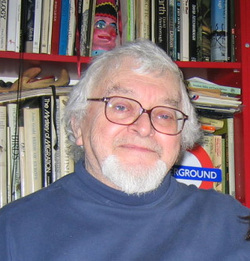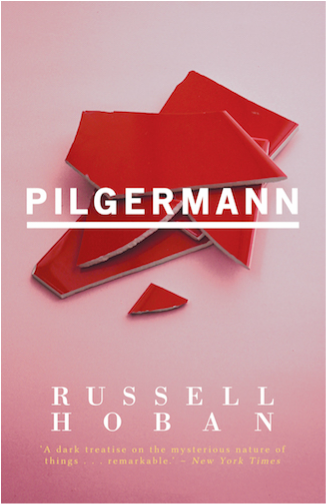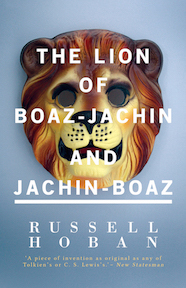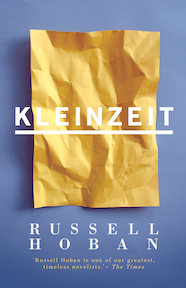|
BOOK DETAILS
Trade paper ISBN-13: 978-1941147825 List Price: $17.99 U.S. Pages: 230 Published: 2015 |
Pilgermann (1983)
Russell Hoban Due to copyright restrictions, this title is only available to customers in the U.S. and Canada.
Book Description
After Pilgermann, a German Jew in the year 1096, ravishes the tax collector's wife, an angry Christian mob retaliates by brutally castrating him. Bleeding and left for dead, Pilgermann experiences a vision of Jesus Christ and resolves to set out on a journey to the Holy Land. Along the way, he will be joined by a motley group of companions: the headless corpse of the tax collector, a lascivious talking pig, a dead bear, and Death himself. In the story of Pilgermann's quest, by turns funny and nightmarish, Russell Hoban is at his most original and most imaginative. |
reviews
'Superb ... Pilgermann is history, metaphysics, a tangle of mysteries, profound and simple.' - Guardian
'Not an easy read, only a fascinating and rewarding one.' - Time
'A Mad Max of a metaphysical story ... intriguing ... mysterious.' - Los Angeles Herald Examiner
'Pilgermann wants to jump off the page to lay hands on your shirtfront.' - Washington Post
'Not an easy read, only a fascinating and rewarding one.' - Time
'A Mad Max of a metaphysical story ... intriguing ... mysterious.' - Los Angeles Herald Examiner
'Pilgermann wants to jump off the page to lay hands on your shirtfront.' - Washington Post
ALSO AVAILABLE THROUGH ONLINE RETAILERS
MORE TITLES BY THIS AUTHOR
AUTHOR BIOGRAPHY
 Photograph courtesy of Lisa Greenstein
Photograph courtesy of Lisa Greenstein
Russell Hoban was born in Lansdale, Pennsylvania in 1925, the son of Ukrainian Jewish immigrants. After high school, Hoban attended art school in Philadelphia and served in the army in Europe during the Second World War, earning a Bronze Star. He married his first wife in 1944 and worked as a commercial illustrator, storyboard artist and television art director from the late 1940s until 1957, and for the next decade as a freelance illustrator for magazines and advertising agencies.
In 1959, Hoban began publishing children’s books; he would write several dozen over the next few decades, the best known of which are the series of books featuring Frances the badger and the classic The Mouse and his Child (1968).
In the late 1960s, Hoban moved to London, in part, he said, to summon inspiration from the ghosts of Victorian England. There he began to write the adult fiction that would define the rest of his career. His first novel for adults, The Lion of Boaz-Jachin and Jachin-Boaz, was published in 1973 and earned favorable reviews and comparisons to the fantasies of C. S. Lewis and J.R.R. Tolkien. It was followed by Kleinzeit (1974), a surreal and comic novel that is among his best loved and of which Hoban said, “I think there’s most of me in Kleinzeit.” The post-apocalyptic Riddley Walker (1980), told in an invented future dialect of English, is regarded by most critics as Hoban’s masterpiece and is considered by many to be one of the great English novels of the 20th century. Other notable works include Turtle Diary (1975), adapted for a 1985 film version starring Ben Kingsley and Glenda Jackson, the metaphysical fantasy Pilgermann (1983) and The Medusa Frequency (1987).
Later in life, Hoban began to publish novels at a more prolific pace, producing an additional ten volumes after age 70. Regrettably, many of these remain unpublished in the United States; however, several of them, including Fremder (1996), Amaryllis Night and Day (2001) and The Bat Tattoo (2002) are extraordinary and deserve rediscovery. Russell Hoban died in 2011 at age 86.
In 1959, Hoban began publishing children’s books; he would write several dozen over the next few decades, the best known of which are the series of books featuring Frances the badger and the classic The Mouse and his Child (1968).
In the late 1960s, Hoban moved to London, in part, he said, to summon inspiration from the ghosts of Victorian England. There he began to write the adult fiction that would define the rest of his career. His first novel for adults, The Lion of Boaz-Jachin and Jachin-Boaz, was published in 1973 and earned favorable reviews and comparisons to the fantasies of C. S. Lewis and J.R.R. Tolkien. It was followed by Kleinzeit (1974), a surreal and comic novel that is among his best loved and of which Hoban said, “I think there’s most of me in Kleinzeit.” The post-apocalyptic Riddley Walker (1980), told in an invented future dialect of English, is regarded by most critics as Hoban’s masterpiece and is considered by many to be one of the great English novels of the 20th century. Other notable works include Turtle Diary (1975), adapted for a 1985 film version starring Ben Kingsley and Glenda Jackson, the metaphysical fantasy Pilgermann (1983) and The Medusa Frequency (1987).
Later in life, Hoban began to publish novels at a more prolific pace, producing an additional ten volumes after age 70. Regrettably, many of these remain unpublished in the United States; however, several of them, including Fremder (1996), Amaryllis Night and Day (2001) and The Bat Tattoo (2002) are extraordinary and deserve rediscovery. Russell Hoban died in 2011 at age 86.



